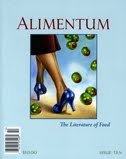 Alimentum‘s second Eat These Words Food Tour & Writing Workshop with Editors Paulette Licitra & Esther Cohen features an Egyptian tour of NYC: dine Egyptian, shop Egyptian, visit a Mosque, and write your thoughts and impressions. Sunday, May 1st, 2011, Manhattan & Astoria, Queens from lunchtime through the evening. Includes:lunch, dinner, tour, and workshop.
Alimentum‘s second Eat These Words Food Tour & Writing Workshop with Editors Paulette Licitra & Esther Cohen features an Egyptian tour of NYC: dine Egyptian, shop Egyptian, visit a Mosque, and write your thoughts and impressions. Sunday, May 1st, 2011, Manhattan & Astoria, Queens from lunchtime through the evening. Includes:lunch, dinner, tour, and workshop.
NewPages Blog
At the NewPages Blog readers and writers can catch up with their favorite literary and alternative magazines, independent and university presses, creative writing programs, and writing and literary events. Find new books, new issue announcements, contest winners, and so much more!
Sycamore Review Poetry Prize Winners
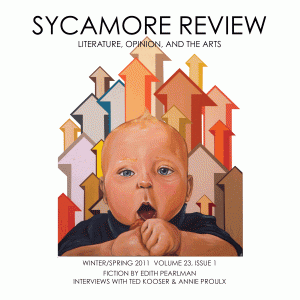 The Winter/Spring 2011 Sycamore Review includes works by the winner of the Wabash Prize for Poetry, “Selene’s Horse” by Nancy K. Pearson: First Runner-Up, “Water Witching” by Jonathan Rice: and Second Runner-Up, “Looking over His Shoulder, Eadward Muybridge Address the Mirror” by Alexander Lumans.
The Winter/Spring 2011 Sycamore Review includes works by the winner of the Wabash Prize for Poetry, “Selene’s Horse” by Nancy K. Pearson: First Runner-Up, “Water Witching” by Jonathan Rice: and Second Runner-Up, “Looking over His Shoulder, Eadward Muybridge Address the Mirror” by Alexander Lumans.
Spread the word!
Toad Suck Review Takes Over The Corpse
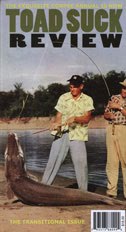 Edited by Mark Spitzer, Toad Suck Review is a national/international literary journal published by the Department of Writing in the College of Fine Arts and Communication at the University of Central Arkansas. Its mission is “to publish the most cutting-edge works of poetry, fiction, creative nonfiction, translations and reviews in the Universe.”
Edited by Mark Spitzer, Toad Suck Review is a national/international literary journal published by the Department of Writing in the College of Fine Arts and Communication at the University of Central Arkansas. Its mission is “to publish the most cutting-edge works of poetry, fiction, creative nonfiction, translations and reviews in the Universe.”
The 2011 debut of issue #1 (the “transitional issue”) marks the transition of the publication from the legendary Exquisite Corpse Annual, which the Writing Department published from 2008 to 2010. “The Toad” now takes the place of “the Corpse” in rebirth of a literary endeavor.
The Toad Suck Review website includes the editorial from this first issue with a discussion of the contributors and future of the publication.
Spread the word!
New Lit on the Block :: Rubbertop Review
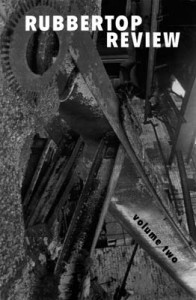 Being a Michigander, I’ve been raised not to take kindly to the Buckeye state, but there are always exceptions to that, especially for anything outside of college football. Rubbertop Review is worthy of just such an exception. Touting itself as “An Annual Journal of The University of Akron and Greater Ohio,” Rubbertop Review is a print annual in its second issue of fiction, poetry, and creative nonfiction.
Being a Michigander, I’ve been raised not to take kindly to the Buckeye state, but there are always exceptions to that, especially for anything outside of college football. Rubbertop Review is worthy of just such an exception. Touting itself as “An Annual Journal of The University of Akron and Greater Ohio,” Rubbertop Review is a print annual in its second issue of fiction, poetry, and creative nonfiction.
Unique to this publication is that each issue of Rubbertop will feature 1/4 of its content from undergraduate and graduate students at The University of Akron. The remainder of the journal will feature work by writers living in Ohio as well as beyond, with no requirement of university affiliation. Rubbertop Review bases selection solely on “the quality of writing and the passion for the craft.”
I picked up Volume Two at AWP, which contains interviews with writers Joyce Dyer, Nin Andrews and Holly Goddard Jones, and works by Sandra Bannister, Tony Bradford, Curt Brown, Kyle Brown, Ed Buchanan, Noah Falck, Ryan Fletcher, Scott Geisel, Eliese Colette Goldbach, T.M. Gottl, Brian Hohmeier, Michael Krutel, Daryl Largent, Dave Materna, Robert Miltner, Ryan Mohr, Michael Parsons, Sammy Snodgrass, Nick Sturm, and Diane Vogel Ferri.
Submissions for the third issue have just recently closed, but issue four will be open for both new and established writers from September 1 – February 1. Professor Eric Wasserman, Rubbertop‘s faculty advisor can be contacted for copies (e-mail address on website).
Spread the word!
A Cappella Zoo – Spring 2011
Brenda Mann Hammack’s poem “Little Hermit Sphinx” exemplifies this journal’s approach, strengths, and unique contribution to contemporary letters. The poem begins: “strings moon moths on thread. So much gauzier than horse-flies, / but not so illicit as eagle feathers.” Provocative syntax; risky images; the exuberant fracture of expectations—these are the hallmarks of A Cappella Zoo and Issue 6 is no exception. Here is the opening of short fiction from J.S. Khan, “Someone Must Stop the Bonapartists!”: “Alas, it is upon us: the most dire cataclysm to befall the Earth since the Late Heavy Bombardment—there are too many Napoleons!” Continue reading “A Cappella Zoo – Spring 2011”
Spread the word!
Alehouse – 2010
“Poetry on tap,” is this journal’s tagline. But who needs booze when there are poets like Jane Mead? I was thrilled to find her here as I have loved her work since her first (watery, in fact) book, and she did not disappoint in “Dust and Rumble”:
Spread the word!
Caketrain – 2010
“This is how it ends.” That’s the first line of a poem by Jess Wigent. Could there be a more wonderful beginning? I love it. I don’t necessarily understand it, but I love it. That’s my overall assessment of the issue—weird endings and beginnings I find compelling and exciting and often perfect, even though I don’t necessarily always understand them or believe I can explain them or even know what genre I’m reading. Wigent’s piece, “This One Thing Truly Makes,” is a marvelous prose poem/story with visual complements of post-it-note/memo style fragments. It’s the idea itself of “what truly makes” that makes the journal appealing, the search for essential meaning. Continue reading “Caketrain – 2010”
Spread the word!
Camas – Winter 2010
With its generous letter-sized pages alone, Camas evokes the open space of the West. This winter issue includes stunning outdoor black-and-white photography, much of it full page, by David Estrada, Doug Davis, Doug Connelly, and others. Between these images is woven a collection of poetry and essays celebrating the many facets of nature and how we humans interact with it. Continue reading “Camas – Winter 2010”
Spread the word!
Coe Review – Fall 2010
The cover of the 2010 poetry issue of Coe Review features a striking photo shot from inside a shed, peering out through two square openings onto lush green farm fields as far as the eye can see. It seems appropriate to the content within these pages, as each poem carves out its own unique opening through which to view the world. Continue reading “Coe Review – Fall 2010”
Spread the word!
Consequence – Spring 2010
Here is a journal that truly is of consequence—poetry, nonfiction prose, fiction, artwork, memoir, and a “discourse,” all by accomplished writers writing about subjects that matter. There isn’t a contribution that doesn’t warrant attention, but it would take me longer than the US has been at war in Afghanistan to describe and critique every piece in the issue, so I’ll preface my brief review with this disclaimer: the selections I’ve chosen to highlight here are not the only ones worth your time or $10 of your disposable income, if, indeed, you have any. If you don’t and you’re lucky enough to live in a community where the public or university libraries offer literary journals, do ask them to subscribe to Consequence. Continue reading “Consequence – Spring 2010”
Spread the word!
Emrys Journal – 2010
By design, coincidence, or some intersection of the two, this issue focuses on writing about families. There are fathers: Judith Skillman’s prize-winning poem “June Bug” (“Heat dozes in the road. / You think of your father, / his love for the stars, / those summer evenings”); Kip Knott’s memoir-style prose “Gabriel’s Horns” (“My father, Gabriel Andrew Henry, had horns and a forked tongue”); and Dorothy Deaver Clark’s story “Still: Life” (“LeeEarle motioned the doctor to follow her to the bedroom where her father lay in his bed with hands clasped over the neatly drawn bedspread and his head propped up by two pillows sheathed with masterfully ironed pillows slips.”). Continue reading “Emrys Journal – 2010”
Spread the word!
The Florida Review – Summer 2010
The journal’s first-ever special issue is a “Native Issue,” with contributions by writers “from many different places—tribal, geographic, aesthetic,” including writers who grew up in the Laguna Pueblo, and members of the Diné, Mi’kmaq Métis, Cherokee, Kanien ‘kehaka, Onodowaga, Yappituka Comanche/Southern Araphaho, Turtle Mountain Chippewa, Arkansas Quapaw, Poarch Creek/Muscogee, Fond du Lac Band of Lake Superior Ojibwe, Oglala Lakota, Seneca, Sioux, Acoma Pueblo, Apache, and Chicasaw tribes and nations. These writers’ work is as distinct and diverse as the communities and nations into which they were born and/or have lived. Continue reading “The Florida Review – Summer 2010”
Spread the word!
Moon Milk Review – Winter 2011
This is a progressive journal that understands the advantages of being online, and offers the reader a number of options that are simply not available in the print format. In the past they have presented an animated version of “The Tell-Tale Heart” by Edgar Allen Poe, a live reading of the same story by Vincent Price, various live comedies by different comedians, artwork by Dali, Goya, and El Greco, and even a Flamenco dance. One never knows what they are going to present each month, but that’s part of the fun. Continue reading “Moon Milk Review – Winter 2011”
Spread the word!
New Letters – 2010/2011
Here is what I appreciate about New Letters: “a whispery shriek like cracked clarinet reeds.” That’s a characterization, by the first person narrator, of the voice of a character in Abby Frucht’s story “Tamarinds,” and if you know anything about clarinets it will be music to your ears. It’s that precision, and the unique and exacting sensibility of New Letters’s writers, that I anticipate and am perpetually grateful to encounter. The writing is unceasingly original, competent, and always worth my time. Continue reading “New Letters – 2010/2011”
Spread the word!
Ninth Letter – Fall/Winter 2011
This is one gigantic Happy Meal of an issue! Or maybe it’s more like Cracker Jacks—that surprise at the bottom of the box that sweetens the whole crunchy-munchy experience. The editors call these goodies “Supplements,” but they are integral to the whole gestalt. The magazine comes shrink-wrapped with a motel key-fob, a pink striped birthday candle inside a small seed envelope, a postcard with an illustration of a take-out dish of “Bacon, Lettuce, Tomato Combination,” a “Newspoem” by William Gillepsie on a skinny folded sheet, an enormous “Corn in the USA” diagram, and a variety of other illustrations, texts, and diagrams on different types of paper stock, which adds to the tactile/sensual pleasure of print. The Art Director’s note explains: “By unwrapping the contents of this issue, you have dislodged the original cover design and set in motion an unpacking of parts that together create a kind of landscape within which the stories, essays, and poems can situate themselves.” Continue reading “Ninth Letter – Fall/Winter 2011”
Spread the word!
Palooka – 2010
Editors Nicholas Maistros and Jonathan Starke introduce their new journal: “we’re determined to find those writers and artists who are flying under the radar producing great works that are going unnoticed by other journals.” The journal’s title comes from the world of prize fighting; its tagline is “a journal of underdog excellence.” Continue reading “Palooka – 2010”
Spread the word!
Red Fez – January 2011
The table of contents for Red Fez 30 sprawls down the scrolling page, heralding articles and reviews, comics and other artwork, poetry, and stories. Feeling a bit overwhelmed by the array of choices, I wasn’t quite sure where to start, but I ended up choosing well with Eric Day’s essay “The Class of 1987.” Eric is reluctant about attending his twentieth high school reunion, and yet for some intangible reason he felt compelled to go. Eric has come a long way from his class clown years, having moved away and earned a master’s degree, gotten married, and become a teacher. But none of his former classmates know any of this. When Eric approaches the greeter’s table and sees all the name badges lined up, he observes that “just a glance at them filled me with terror.” Much of what follows is to be expected: stilted conversation, awkward moments with an old girlfriend, and social dynamics that seem to have frozen in time. But as the night progresses, Eric finds that a few things actually have changed and he even ultimately makes a few tenuous connections. Continue reading “Red Fez – January 2011”
Spread the word!
The Susquehanna Review – 2010
A student journal as youthful and energetic and innocently/un-innocent as…well…youth: “You dig your fingers, thick with car grease / into me. I shiver toward you,” writes Caroline Kessler in “I Open My Mouth to the Storm.” Rob Rotell offers another storm of emotion in his story “A Couple of Problems,” which begins: “He woke up to Nikki’s crying. She sounded as if she was hiccupping. Her sobs were soft. They had a quick tempo.” Staci Eckenroth, too, starts off with a moment of heightened sensation in “a dime a dozen”: Continue reading “The Susquehanna Review – 2010”
Spread the word!
West Branch – Fall/Winter 2010
A terrific issue! Strong, memorable poems, including translations from the Italian by Martha Cooley and Antonio Romani of the work of Gianpiero Neri; a great essay by Katie Ford “Writing About the City: New Orleans, Destruction, and the Duty of the Poet”; a satisfying story by Urban Waite, “No One Heard a Thing in the Night the Chicken Died”; thoughtful book reviews; and Garth Greenwell’s “To a Green Thought” essay, this issue’s “Marginalia,” one of the journal’s most original and appealing features, which focuses this time on recordings of poems. Continue reading “West Branch – Fall/Winter 2010”
Spread the word!
The History of Violets
The History of Violets is a book to read at dusk, when the light changes, the room darkens and the boundaries between day and night, real and fantastic, seem permeable. First published in Spanish in 1965, Uruguayan poet Marosa di Giorgio's collection of short prose poems, as translated into English by Jeannine Marie Pitas, is a voyage into a garden world populated not only by exquisite flowers and hearty vegetables, but also angels, underground creatures and rabbits, figures both tragic and destructive. Throughout the book, we follow a family living by the garden, whose house is often invaded by its denizens, whether it is the insistent angels or the crazy gladioli. Di Giorgio's own particular brand of magical realism and gift for compelling description ease us into this world where the erotic pulse of creation in the garden is counterbalanced by an undercurrent of death and destruction. Continue reading “The History of Violets”
Spread the word!
A Walk in Victorias Secret
I was fortunate to hear Kate Daniels read many of the poems from A Walk in Victoria's Secret when it was still a work-in-progress. I'm a firm believer in getting a poet's verbal take on their own work, and while I've been disappointed on some occasions (Wallace Stevens, anybody?), the experience is often revelatory. Daniels was not particularly intense or melismatic in her delivery, but she was involved in the poems well beyond the performance itself—connected might be a better word. The effect of that connection was that she-as-reader was a potent conductor not just of the words on the page, but the emotive power beneath them—she conveyed that sentiment without telegraphing it ahead, or lapsing into sentimentality; a distinct advantage when you are a narrative poet, which resulted in an audience that hung engrossedly on her every word. Continue reading “A Walk in Victorias Secret”
Spread the word!
Sonja Sekula
Sonja Sekula (1918-1963) was a Swiss “poète-peintre” (poet-painter) who lived for a time in New York, was a colleague and friend of better known artists of her time (Jackson Pollock, Frida Kahlo, John Cage, Leonora Carrington, Max Ernst), experimented with “blended poetic word combinations” in her visual work, and spent much time “in and out of clinics” because, Schaeppi explains in her book’s epilogue, “her many secret art books and diaries tell of her passion for women in a time when same-sex love was considered a pathology to be cured with extreme treatments.” Continue reading “Sonja Sekula”
Spread the word!
Lit from Within
This anthology brings together presentations given over the last several years at Ohio University’s Spring Literary Festival, which is described by the editors in the book’s introduction as “a remarkable yearly gathering of some of the nation’s most talented and celebrated writers…in the most rural corner of Ohio.” Fifteen of these celebrated fiction writers and poets appear in the publication, to be released in March 2011: Ron Carlson, Robin Hemley, Francine Prose, Billy Collins, Peter Ho Davies, Charles Baxter, David Kirby, Claire Bateman, Stephen Dunn, Lee K. Abbott, Tony Hoagland, Maggie Nelson, Carl Dennis, Rick Bass, and Mary Ruefle. Each writer focuses on a clearly identified, often narrowly defined topic of interest to readers and writers, typically with the twin goals of helping readers understand the writer’s personal approach to composing his or her work and to an idea of some “universal” importance for reading/writing in general. Continue reading “Lit from Within”
Spread the word!
The Book Bindery
Although it includes a glossary of bookbinding terms and a three-page photo-essay on “How To Bind A Book,” The Book Bindery is less about book binding than the function of creativity and negativity in a work environment. Sarah Royal, who worked briefly at a bindery in Chicago right after graduating from college, writes that “even if you’re in utter bliss over your job, you still need to feed off of negativity in some form or another. Bitching about what you’re doing or joining in on bitching about someone else’s predicament is what makes everything roll by day to day.” She and her colleagues spent hours gossiping about their transvestite boss, coworkers, and the naked neighbor who lived next door to the factory. They played Bingo with the most common quips made by the bindery’s secretary over the Intercom. During coffee hour they built a shrine out of “action figures, Hot Wheels, badminton rackets….whatever interesting and weird shit we could find.” Continue reading “The Book Bindery”
Spread the word!
Best Road Yet
Ryan Stone’s writing absolutely shines in his collection of twelve short stories entitled Best Road Yet. In particular, Stone is able to create realistic, multilayered characters who have distinct personalities—the way they speak, talk, eat, and even snore is engrossing, largely because Stone takes the time to develop the details and complexities of each individual. He writes: “He was only a sliver, a slip of the tongue they sometimes let out, and that’s how they mentioned him. Eddie’s coming, too, they’d say.” It is clear that Stone writes with intention, aware of how each element of writing contributes to the development of the story, and he has great control in his work. Continue reading “Best Road Yet”
Spread the word!
Driving Montana, Alone
There are only 500 copies of this priceless little postcard book and I am the proud owner of #161. Reminiscent of the linked postcard books available on those little turning stands in shops and drugstores and souvenir outlets in tourist towns, the top-bound spiral book of photos (all but the title page by Ron Rapp were taken by the poet) and poems was the winner of the press’s 2010 chapbook competition. The poems are stark little stories that match the landscapes depicted. They reflect the same sense of poetic sensitivity and originality the poet demonstrates in her title’s punctuation (that extraordinary comma). Continue reading “Driving Montana, Alone”
Spread the word!
Everything Else We Must Endure
Everything Else We Must Endure is the first collection of poetry by Irish poet Brian McGettrick. The book, published by sunnyoutside, a small independent press, is beautifully designed—a slim gold-colored volume with artwork by Jonathan Barcan on the cover. Continue reading “Everything Else We Must Endure”
Spread the word!
Bloom
Bloom, Simmons B. Buntin’s second poetry collection, is a book that immediately draws the reader in. Buntin’s comforting tone invites the reader to pull up a chair and listen to his stories—stories about his family, the desert landscape of Arizona, and light and darkness. The book is divided into three sections—“Shine,” “Flare,” and “Inflorescence,” further developing the subtle thread of light versus darkness that can be found in the undercurrent of his poems. Continue reading “Bloom”
Spread the word!
Prodigal: Variations
I love Ed Madden’s poetry best when he is talking about the landscape of his childhood. “Forsythia, early spring,” begins with the vivid description: Continue reading “Prodigal: Variations”
Spread the word!
Meddle English
Bergvall’s bio is worth reading before engaging with Meddle English, and I say engaging (rather than reading) because this isn’t a book one reads in a traditional sense, but more like a book to be considered. Here’s the first paragraph of the poet’s page-long bio: Continue reading “Meddle English”
Spread the word!
Prayer Book
In Prayer Book, Matt Mauch’s poems are prayers for the simple, everyday things. They are “Prayers to be prayed over French fries, green beans, sausages, the rest,” and “Prayers for those flying solo on jet plans ascending and descending through turbulence reminded of the ghost on a bicycle ghost-riding stairs.” Continue reading “Prayer Book”
Spread the word!
the Homelessness of Self
“I make and remake myself,” the poet writes in “No Stork,” the collection’s opening poem. The whole of the book is similarly smart, composed of economic lines that contain more than seems possible, given their deceptive simplicity and plain diction. Terris reminds us that poetry need not be arch and “high brow,” down and dirty (edgy, rough, street-wise), or impossibly inventive (structurally or syntactically over-ambitious) to be artful (“If I / told you what I know, you’d question / my solutions”). Continue reading “the Homelessness of Self”
Spread the word!
The Manageable Cold
The Manageable Cold, Timothy McBride’s first poetry collection, is perfect to read in the midst of a hard winter. I was surprised to see that this was only his first book, since McBride writes with a confidence and skill that one would not expect from a new poet. McBride is not afraid to experiment with form, and the book includes forms ranging from free verse to villanelle to sonnet. He explores the theme of “manageable cold” through the physical coldness of winter, country life, relationships, and the bleak hardships of his father’s favorite sport, boxing. Continue reading “The Manageable Cold”
Spread the word!
Invocation: An Essay
One great idea. One beautiful little book. Ander Monson of New Michigan Press creates fantastic chapbooks with a preference, and special contest for, innovative hybrid manuscripts. The full-length chapbook essay form is especially appealing, and Cheng’s work is perfect for this structure. Her chapbook is a personal memoir-photo-cultural exploration-essay in one compact, smartly designed package (publisher/editor Monson is also the designer). Continue reading “Invocation: An Essay”
Spread the word!
NewPages Updates :: March 13, 2011
The following have been added to The NewPages Big List of Literary Magazines:
Saltwater Quarterly – fiction, creative non-fiction, poetry
inter|rupture – poetry, fiction, art
Anak Sastra – fiction, creative non-fiction
Draft – first and final drafts with author interviews
Polaris – undergraduate poetry, fiction, visual art, and nonfiction
Kugelmass – humor stories and essays
12th Street – fiction, non-fiction, poetry, interviews, visual art, photography
Poetry South – poetry
The Emerson Review- fiction, poetry, nonfiction, visual art
Haigaonline – haiga
The following have been added to The NewPages Big List of Alternative Magazines:
Obit – a forum for ideas and opinions about life, death, and transition
Writing Conferences, Workshops, Retreats, Centers, Residencies & Book & Literary Festivals
E-POETRY 2011 (New York) – International Digital Language Arts Festival, May 18-21
Spread the word!
Conversations and Connections: Practical Advice on Writing
From Dave Housley (Barrelhouse magazine):
“Get the real scoop directly from the people who are making decisions about publishing every day. Conversations and Connections is held in downtown Washington, DC, and features editors from a mix of established and cutting-edge literary magazines and small presses. Our panels and craft workshops are led by writers and editors from a wide variety of styles and genres, all speaking to issues that will help you take your writing to the next level. Our keynote this year is Steve Almond. Your registration fee of $65 includes the full day conference, a book of your choice, a year subscription to a participating literary magazine, and one ticket to ‘speed dating with editors,’ where you’ll get immediate feedback on your work. This conference sells out every year.”
Date: April 16, 2011
Spread the word!
Lost & Found Chapbook Series
Lost & Found: The CUNY Poetics Document Initiative features extra-poetic work – correspondence, journals, critical prose, and transcripts of talks – of New American Poets, their precursors and followers. These primary documents are uncovered in archival research and edited by students and scholars at The Graduate Center, CUNY, as well as visiting fellows and guest editors, and prepared by Ammiel Alcalay, General Editor. Lost & Found puts into wider circulation essential but virtually unknown texts to expand our knowledge of literary, cultural, social, and political history.
Subscription prices vary by level of support, but all include the chapbook series for the year. The 2011 Lost & Found Series II (ISBN: 978-0-615-43350-9) includes:
Selections from El Corno Emplumado/ The Plumed Horn
ed. Margaret Randall
Diane di Prima: The Mysteries of Vision: Some Notes on H.D.
ed. Ana Božičević
Diane di Prima: R.D.’s H.D.
ed. Ammiel Alcalay
Barcelona, 1936: Selections from Muriel Rukeyser’s Spanish Civil War Archive
ed. Rowena Kennedy-Epstein
Jack Spicer’s Translation of Beowulf:Selections
eds. David Hadbawnik and Sean Reynolds
Robert Duncan: Olson Memorial Lecture #4
eds. Erica Kaufman, Meira Levinson, Bradley Lubin, Megan Paslawski, Kyle Waugh, Rachael Wilson, and Ammiel Alcalay
Spread the word!
Contest Alert from Writer Beware
Victoria Strauss on Writer Beware gives input on the TheNextBigAuthor.com contest: “When entering a competition, you should always know exactly with whom you’re dealing.” Seems to go without saying, and yet…
Spread the word!
Crow Arts Manor to Open in Portland
 Crow Arts Manor is a 500-square-foot space in Northeast Portland, Oregon that will be home to classes (writing, fine and graphic arts), music, readings, and gallery space.
Crow Arts Manor is a 500-square-foot space in Northeast Portland, Oregon that will be home to classes (writing, fine and graphic arts), music, readings, and gallery space.
Crow Arts Manor means to offer affordable, six-week classes from a roster of instructors known as some of Portland’s most talented writers and artists. Currently scheduled is Emily Kendal Frey: Poetry Workshop; Jesse Reklaw: Elements of Cartooning; Zachary Schomburg: The Narrative Prose Poem.
Crow Arts Manor has access to the original Baptist chapel in the building and will be hosting a number of musical performances and literary readings. The gallery will host 8-10 visual artists, with work rotating every three months. They are also in the process of building one of the largest libraries of independently produced books and journals in the country with the goal to have the space open six hours a day, inviting the public to come and read.
The grand opening is April 8-10.
[Logo image by Jennifer Parks.]
Spread the word!
Video-Poetry Magazine Jupiter 88
 With an endearingly low-budget production style, Jupiter 88 is an enjoyable way to take in contemporary poetry read by the poets. Hosted and published by poet CA Conrad, episodes thus far include video-poem readings by Joanna Fuhrman, Stacy Szymaszek, Laura Spagnoli, Ryan Eckes, Paul Legault, Janet Mason, Joshua Beckman, Robert Dewhurst, Michelle Taransky, Anne-Adele Wight, Eileen Myles & Leopoldine Core, Erica Kaufman, Filip Marinovich, Rod Smith, Mel Nichols, Ryan Walker, Frank Sherlock, and Debrah Morkun.
With an endearingly low-budget production style, Jupiter 88 is an enjoyable way to take in contemporary poetry read by the poets. Hosted and published by poet CA Conrad, episodes thus far include video-poem readings by Joanna Fuhrman, Stacy Szymaszek, Laura Spagnoli, Ryan Eckes, Paul Legault, Janet Mason, Joshua Beckman, Robert Dewhurst, Michelle Taransky, Anne-Adele Wight, Eileen Myles & Leopoldine Core, Erica Kaufman, Filip Marinovich, Rod Smith, Mel Nichols, Ryan Walker, Frank Sherlock, and Debrah Morkun.
Spread the word!
Sampsonia Way
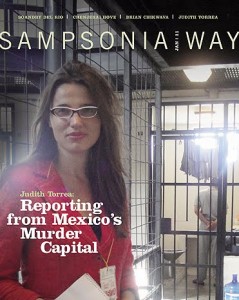 Sampsonia Way is an online magazine sponsored by City of Asylum/Pittsburgh celebrating literary free expression and supporting persecuted poets and novelists worldwide.
Sampsonia Way is an online magazine sponsored by City of Asylum/Pittsburgh celebrating literary free expression and supporting persecuted poets and novelists worldwide.
Previous issues of the magazine have focused on Burma, China, Cuba, Haiti, and Iran. The current issue of the magazine includes:
“Soandry del Rio: Can’t Stop. Won’t Stop.” by Joshua Barnes
“You Must Face the Consequences: The Price of Committing Journalism in Zimbabwe” by Elizabeth Hoover
“Under the Shadow of Drug Trafficking” by Silvia Duarte
“Aaron Jenkins: Getting Stuff Off His Chest” by Jen Lue
“Women Who Don’t Bite their Tongues: Writing Workshop Celebrates More Than Thirty Year” by Elizabeth Hoover
Spread the word!
Pudding Magazine New Editor
Connie Everett has taken over the editorial role for Pudding Magazine, one of the longest-running print journals in the U.S. Printed by Pudding House Press, Pudding Magazine continues its quarterly tradition with a look to updating guidelines, subscriptions, and submissions online. Welcome aboard Connie – great to see PM continue onward and e-ward!
Spread the word!
Flying House Writer-Artist Collaboration
 Flying House is an annual collaboration project that kicks off in May with the announcement of five artist-writer pairs. Once the pairs are picked, they have a good month to swap ideas back and forth. After six months, with deadlines and check-ins along the way, Flying House culminates in a visual and written representation of the collaborations in a gallery space with a reading and celebration.
Flying House is an annual collaboration project that kicks off in May with the announcement of five artist-writer pairs. Once the pairs are picked, they have a good month to swap ideas back and forth. After six months, with deadlines and check-ins along the way, Flying House culminates in a visual and written representation of the collaborations in a gallery space with a reading and celebration.
On Saturday, December 11, five writers met their five artist partners at the Maes Studio in downtown Chicago, IL, for a night of artistic revelry. The participants were:
Megan Fink and Chris Annen
AB Gorham and Michael Maes/Jillian McDaniel
BJ Hollars and Jenae Neeson
Daniel Letz and J Paonessa
Danilo Thomas and Jason Watts
Applications for the 2011 Flying House are open until April 25. Artists and writers need not apply together, in fact, Flying House discourages that.
Spread the word!
Welcome :: BRICKrhetoric
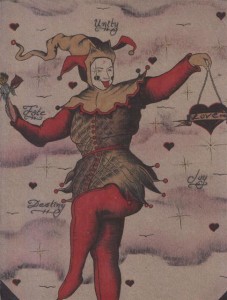 Sarah Khan is the editor of BRICKrhetoric, an online literary & visual arts journal based in Chicago. “BRICKrhetoric was established in 2009 to provide a canvas for emerging and established artists alike to share their work, illuminating topics in the humanities for the discovery and enjoyment of its readers. BRICKrhetoric features original poetry, prose, artwork and photography with a multicultural and urban focus.”
Sarah Khan is the editor of BRICKrhetoric, an online literary & visual arts journal based in Chicago. “BRICKrhetoric was established in 2009 to provide a canvas for emerging and established artists alike to share their work, illuminating topics in the humanities for the discovery and enjoyment of its readers. BRICKrhetoric features original poetry, prose, artwork and photography with a multicultural and urban focus.”
BRICKrhetoric was founded in November 2009, on the campus of East-West University in Chicago, IL, and initially invited submissions from students, faculty, staff & friends of the university for the first three issues. In December 2010, BRICKrhetoric became independently-run by a small group of volunteers, and shifted its focus to include students from across Chicagoland (and beyond) with a mission to support literacy, promote cross-cultural perspective, celebrate the literary/visual arts, and provide a canvas for writers/artists (of any age) to share their work.
[Pictured: “Love Joy Faith Destiny Unity” by Alfred Phillips from the June 2010 issue]
Spread the word!
Dos Passos Features Bonnie Bolling
 The Dos Passos Review Spring 2011 (7.2) offers a special preview of the works by Briery Creek Press Liam Rector First Book Prize for Poetry 2011 winner Bonnie Bolling. Over a dozen poems from her collection In the Kingdom of the Sons are offered in this journal issue.
The Dos Passos Review Spring 2011 (7.2) offers a special preview of the works by Briery Creek Press Liam Rector First Book Prize for Poetry 2011 winner Bonnie Bolling. Over a dozen poems from her collection In the Kingdom of the Sons are offered in this journal issue.
Spread the word!
Against Expression Preview
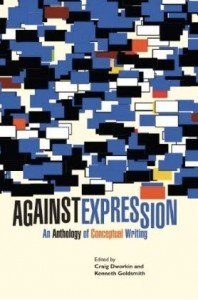 The introductory essays and Table of Contents to Against Expression: An Anthology of Conceptual Writing (2011, Northwestern U Press) are available for download. The first essays by the editors are “Why Conceptual Writing? Why Now?” by Kenneth Goldsmith and “The Fate of Echo” by Craig Dworkin.
The introductory essays and Table of Contents to Against Expression: An Anthology of Conceptual Writing (2011, Northwestern U Press) are available for download. The first essays by the editors are “Why Conceptual Writing? Why Now?” by Kenneth Goldsmith and “The Fate of Echo” by Craig Dworkin.
Spread the word!
River Styx Poetry Contest Winners
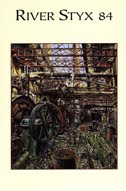 Issue 84 of River Styx includes poems by the winners of the 2010 River Styx International Poetry Contest:
Issue 84 of River Styx includes poems by the winners of the 2010 River Styx International Poetry Contest:
1st Place Stephen Gibson, “Megapixels”
2nd Place Diana Arterian, “The Albatross, Golden Mollymawk”
3rd Place Will Greenway, “Annunciation”
Honorable Mention Susan Cohen, “Pantoum of The Blue Virgin”
The 2011 contest is currently open until May 31, 2011; Judge B. H. Fairchild.. Entrance fee includes a one-year subscription to the magazine, all entrants are considered for publication, and the winners are published with the first place winner receiving $1500.
Spread the word!
New Lit on the Block :: Parcel
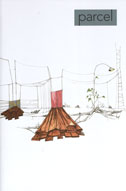 Edited by Kate Lorenz with Designer Justin Runge, Parcel is a biannual print publication, sent to subscribers with limited edition broadsides and postcards. Publisher Heidi Raak is also owner of The Raven Book Store, in Lawrence, KS.
Edited by Kate Lorenz with Designer Justin Runge, Parcel is a biannual print publication, sent to subscribers with limited edition broadsides and postcards. Publisher Heidi Raak is also owner of The Raven Book Store, in Lawrence, KS.
The first issue of Parcel (Spring 2011) includes works by Kate Bernheimer, Brooklyn Copeland, Daniel Coudriet, Nick Courtright, Jenny Gropp Hess, Daniel A. Hoyt, Friedrich Kerksieck, Jeffry Koterba, Kristy Logan, Peter Longofono, BJ Love, Anthony Luebbert, Michael Martone, Susan McCarty, Jaclyn Mednicov, Matt Moore, Matthew Nienow, Brian Oliu, Pamela Ryder, Christopher Salerno, and J.A. Tyler.
Parcel is available for subscription ($20/yr) and is open for online submissions using Submishmash.
Spread the word!
Alimentum Wants Your Menupoems
For the 5th year in a row Alimentum celebrates National Poetry Month with menupoems – broadsides placed in area restaurants for the month of April.
From Esther Cohen, Alimentum‘s menupoems editor:
We’ve been wondering
What menu of words
What words would make you
Really happy to see
On your menu
Words to replace
The ordinary army
Appetizer
Entr
Spread the word!
Music on Burner
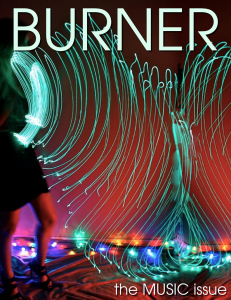 The newest issue of Burner Magazine online is The Music Issue, with editorials and features of Yoko Ono, Saul Williams, Broken Social Scene, Chromeo, Pendulum, Russ Chimes, Peaches, Seefeel, Humans, Bikini, and Canadian media personalities, Jian Ghomeshi and Kate Carraway. All selected poetry, prose, photography and visual art revolve around the theme of music.
The newest issue of Burner Magazine online is The Music Issue, with editorials and features of Yoko Ono, Saul Williams, Broken Social Scene, Chromeo, Pendulum, Russ Chimes, Peaches, Seefeel, Humans, Bikini, and Canadian media personalities, Jian Ghomeshi and Kate Carraway. All selected poetry, prose, photography and visual art revolve around the theme of music.
